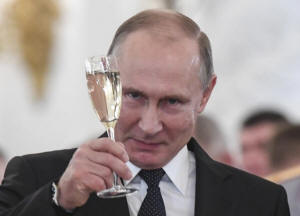|
Navalny, a fierce critic of President Vladimir Putin, on
Wednesday announced a series of rallies across Russia on Jan. 28
to press home his call for a boycott of the election, in which
he has been barred from running.
Kremlin spokesman Dmitry Peskov said Navalny's move would be
carefully studied.
"We have the appropriate agencies who, as you know, check such
calls and plans to see if they are lawful," Peskov told a
conference call with reporters. "There is no doubt that this
will be done."
Polls indicate that Putin, who has dominated Russia's political
landscape for 18 years, is on course to comfortably win
re-election on March 18, but Navalny says his own exclusion
makes a farce of the ballot.
An election boycott could pose a problem for the Kremlin, which
is keen to ensure a high turnout in the election to help confer
legitimacy on Putin's expected victory amid some signs of apathy
among voters.
Under Russian law, the time and place of public rallies must be
agreed in advance with the authorities, who have often declined
to authorize them in the past, citing conflicting events or
security concerns.
When the opposition has gone ahead anyway, the police have
broken up rallies by force and detained participants.
Navalny, who has organized some of the biggest anti-government
demonstrations in years, has been jailed three times this year
and charged with breaking the law for organizing public meetings
and rallies.
(Reporting by Denis Pinchuk; writing by Andrew Osborn; editing
by Mark Heinrich)
[© 2017 Thomson Reuters. All rights
reserved.] Copyright 2017 Reuters. All rights reserved. This material may not be published,
broadcast, rewritten or redistributed.

|
|






